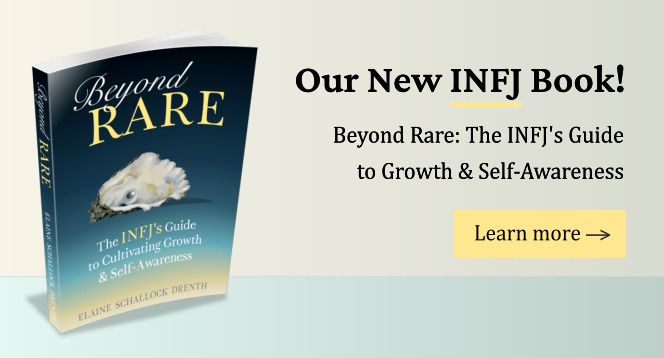
Some introverted types are more apt to be mistaken for extraverts than others. In our experience, the INFJ is the type most commonly misperceived as extraverted, although this can occur with the INTJ as well.
There are a number of personality factors commonly associated with extraversion. These include traits like warmth, sociability, enthusiasm, talkativeness, and social assertiveness. In this post, we will explore which of these extraverted characteristics INFJs and INTJs (i.e., “INJs”) are exhibiting. We will also turn to type theory to help us understand why.
Intuition (N), Talkativeness & Talk Therapy
In our post, Which Personality Types are Most Talkative?, we suggested that intuitive (N) types are generally more talkative than sensing (S) types. This can be attributed to the fact that intuition is in charge of handling abstract ideas / symbols and language itself happens to be a symbolic enterprise for communicating ideas. Consequently, N types tend to be drawn to and adept at learning languages of all sorts.
Because both INFJs and INTJs employ intuition, or more specifically, Introverted Intuition (Ni), as their dominant function, they can be quite loquacious, especially when discussing topics that interest them. I’ve often said that INJs are natural lecturers. Once Ni gets something in its craw, INJs are prone to extensive monologues, providing whatever backstory and illustrations are required for its explication. Moreover, if INJs perceive that their interlocutor has yet to fully understand or agree with them, they aren’t opposed to rehashing things until they are confident everyone is on the same page. In this regard, INJs can be rather patient teachers, especially when they sense that their audience is engaged and capable of digesting what they have to say.
Since INJs spend much of their lives internally amassing insights, they get excited when they finally encounter others (often NP types) who are eager to hear and discuss their ideas. Knowing that their insights are being valued and appreciated by others, even if only by a select few, can provide INJs with a much needed sense of validation. And in most cases, conversation is the most convenient and reliable way for this to happen.
In addition to providing a forum for disseminating their insights, talking seems particularly therapeutic for INJ types. They benefit from discussing their problems rather than trying to handle them solo in the manner of IP types. This may in part be due to Ni’s penchant for abstract symbolizing through language, which can grant INJs a sense of understanding and control over their problems. INJs are constantly investigating the root cause of their problems, and language is their preferred tool for diagnosing and naming them. This process of “making sense,” to borrow Sam Harris’s podcast title, seems to go a long way in alleviating INJs’ suffering.
When things aren’t adding up, however, such as when INTJs are trying to make logical sense of a failed relationship, this process can be painful and frustrating for both the INJ and their interlocutor. Because it feels so important for INJs to fully understand things, it can be really hard for them to hang up the phone, even after hours of grueling analysis, if things haven’t been entirely resolved.
INFJ / INTJ Verbal Quickness & Assertiveness
As discussed in Elaine’s post, Know Your Judger, Judging (J) types are notorious for being direct and forthright in their communication. Especially early in life, they can have a hard time not voicing their judgments. This is really no surprise when we consider that their preferred judging function, be it Extraverted Feeling (Fe) or Extraverted Thinking (Te), is extraverted in nature.
Extraverts are sometimes characterized as thinking or feeling aloud, often without significant forethought. However, because Ni works quickly and convergently, some INJs can proffer judgments as rapidly and frequently as extraverts.
But again, it really depends on the situation. We’ve all encountered extraverts who feel obliged to comment on anything and everything, exercising little to no discrimination; they simply can’t help themselves. INJs (especially INTJs), however, are more choosy. It is not uncommon for INTJs to be completely silent during long periods of small talk, only to suddenly perk up, like a gopher out of hole, once a more substantive topic is brought to the fore.
INFJ Warmth, Enthusiasm & Social Concern
As I mentioned earlier, INFJs are the most likely of all introverts to be perceived as extraverts. In addition to their talkativeness and verbal quickness, INFJs commonly exhibit two extraverted traits in ample measure—warmth and enthusiasm—both of which can be attributed to their Extraverted Feeling (Fe) function.
As I discuss in my book, My True Type, one of Fe’s primary concerns is social harmony. It aims to ensure that everyone feels welcome and that the overall emotional vibe is positive. One tool INFJs use to facilitate social harmony is enthusiasm. By exuding enthusiasm around others, they can spread positive energy and improve the emotional tenor of the group.
That said, because INFJs appear more serious and self-contained when introverting (Ni), their intimates will often see them as having two distinct sides. When operating in introverted mode, they can seem aloof and detached, indifferent to the world around them. However, in social contexts, they can appear entirely different, fully attuned to the needs and emotions of others. As discussed in our INFJ profile, the tension between these two modes of operating is a chronic source of stress and conflict for this type.
Not having Fe, INTJs typically don’t feel responsible for maintaining group morale. And even if they did, they’d probably have a hard time procuring it. While INTJs tend not to be particularly warm or inviting, they can be enthusiastic in their own way about things they care about. But for all intents and purposes, this is rarely enough to make them appear extraverted. Whatever extraversion INTJs exhibit typically pertains to their talkativeness, verbal quickness, and forthrightness.
Learn more about INFJs & INTJs in our books:
The 16 Personality Types: Profiles, Theory & Type Development
Beyond Rare: The INFJ’s Guide to Growth & Self-Awareness
Unsure if You’re an INJ type?
Take our type clarifier tests:
The INFJ-INFP Type Clarifier | The INTJ-INTP Type Clarifier
